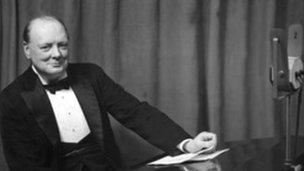The BBC has faced worse crises
- Published
- comments

Winston Churchill wanted to take over the BBC as an instrument of propaganda
It's your turn.
That sums up in three words the attitude of many politicians and many in the press to the BBC crisis.
Having lived through their own crises - which critics argue the BBC reported with gusto - sympathy is in short supply.
In recent years, they've seen reputations trashed, jobs lost and people arrested and/or imprisoned.
So they will not see the resignation of a Director General after a mauling by John Humphrys as a cause for much mourning.
What I do not detect, however, is any threat to the existence or status of the BBC - unlike previous rows which pitted governments against the Corporation.
In 1926 when the country was riven by the General Strike, Churchill wanted to take over the BBC as an instrument of propaganda.
Anthony Eden's government drew up plans to take over the Corporation during the Suez Crisis of 1956.
Margaret Thatcher's clashes with the BBC over the Falklands War and coverage of the IRA led to the removal of a DG.
Tony Blair and Alastair Campbell's legal war over the sexed-up Iraq dossier and those missing weapons of mass destruction felled both the DG and the Chairman.
All these crises posed greater threats, in my view, than today's crisis - serious and disturbing though it undoubtedly is.
The prime minister has not sought to impose a government enquiry on the BBC undermining the independence of the BBC Trust.
He has not called for either the Director General's or Chairman's resignation. So far neither has the relevant Select Committee.
Some senior Conservatives believe that Newsnight jumped on a bandwagon launched by one of the party's bitterest foes, Labour MP Tom Watson, who first made a link between child abuse and unnamed Tory politicians.
Many politicians are watching the BBC reeling from its self-inflicted wounds with a mixture of amazement and frustration but I detect little anger or desire for retribution.
One lesson of this crisis is the speed with which people and organisations can move from heroes to zeros - from the triumph of the Olympics to the trough of child abuse.
Another is that you don't have to wait very long for one crisis to replace another.
The next one, coming soon, will pit the press against politicians who believe the law should underpin any new system of regulation.
Today it's the BBC's turn but it will be someone else's soon.